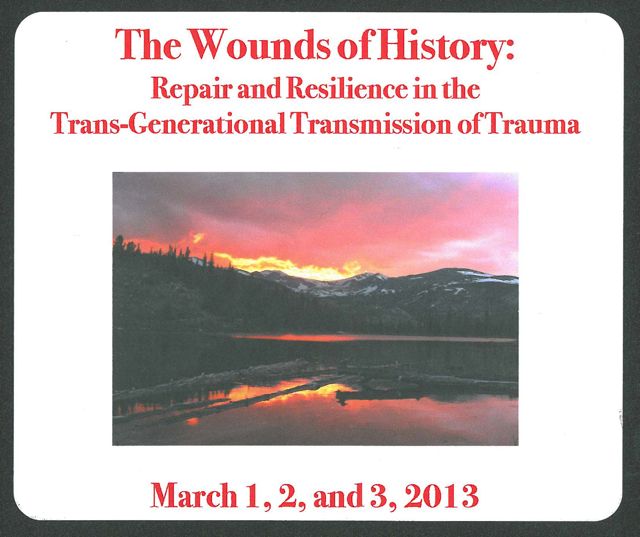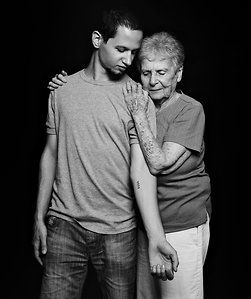This weekend, I had the opportunity to attend The Wounds of History: Repair and Resilience in the Trans-Generational Transmission of Trauma conference that was sponsored by the NYU Postdoctoral Program in Psychotherapy and Psychoanalysis, The Psychoanalytic Society of the Postdoctoral Program, and the NYU-GSAS Trauma and Violence Transdisciplinary Studies Program.
The speakers were expert trauma-related mental health professionals (a few of whom were also historians) who had a wealth of knowledge, as well as their own personal experiences of trans-generational trauma which they used to underscore the points they made in their moving presentations.
In this post, I will start to unpack for you some of the gems shared but I will do it slowly, for your safety, as well as mine.
Today’s post focuses on some of the key take-aways from Dr. Sam Gerson’s presentation on:
Witnessing, Testimony and Repair: Legacies from the Holocaust
As per Dr. Sam Gerson, the Holocaust has led to:
- Linkages across time being ruptured and repetition replacing memory as placeholder and experience
- Historical facts, as imagined by descendants, creating fault lines in their internal geography as the world having been subject to destruction
- Descendants experiencing two primary effects:
- A chasm in what can be known, as it exists in their parents, as a result of their own traumatic experiences that they cannot describe/speak about
- A deep fissure between generations – an unbridgeable space that constitutes a trauma for subsequent generations
- These effects exist as absences for the descendants rather than as losses. This is very different for the survivor parents who mourn multiple losses. Children of survivors had no deceased grandparents to bury or mourn.
- This fracturing of continuity leaves a gaping hole in the core. Absence yields unending anxiety, not being able to forge connections between past, present and future. Ghosts now haunt the empty space where murdered ancestors once lived.
- Descendants try to fill the chasm with memories not of their own with the injunction “never forget” of what was never known.
Tattooed arms of three descendants
- One recent poignant example of how some descendants are trying to fulfill this command was illustrated by a number of children and grandchildren of Auschwitz survivors in Israel who tattooed their arms with the same numbers of their grandparents in order to be intimately bonded with their parent/grandparent; they did not want to forget.
Both survivor and descendant tattooed
I found this conference to be invaluable – you were not just being informed and enlightened but the content was so powerful that you were on an emotional roller coaster as you were exposed to different traumas.
While there were a couple of meetings provided to help us process our feelings, I have remained with upset emotions inside that I do not yet know what to do with.
Do you have any suggestions? What are your thoughts about Dr Gerson’s view of transgenerational trauma vis a vis the Holocaust? Please share your thoughts and/or comments below.
References:
Gerson, S. (March 1, 2013). Witnessing, testimony and repair: Legacies from the Holocaust in the Wounds of History: Repair and Resilience in the Transgenerational Transmission of Trauma.
Rudoren, J. (September 10, 2012). Proudly bearing elders’ scars, their skin says “never forget”. New York Times.





I know my husband – a child of survivors- spent many years struggling with these emptinesses, & absences too. Still does sometimes.
His parents never spoke about it ever. His grandmother – who along with his mother had been in Auchwitz and Bergen Belsen as well as a secondary “unheard” of work camp called Unterluss – agreed to speak to him about it as best she could in her mid 90’s (she lived until 102) – and she was agitated and sleepless, retraumatized for months – but it meant a great deal to my husband – who had only silence in that space. And his worst imaginings. Breaks in continuity occur when we experience the unspeakable.
Many people – scholars, historians – also doubted her memory about this smaller camp – Unterluss –
Grandma eventually spoke the Shoah project as well –
and last week there was an article in the NY times about the thousands of unrecognized, undocumented, unacknowledged smaller work camps and slave labor houses. Which filled in another small hole in the lost narrative thread. Was horrible, and weirdly relieving. My husband couldn’t read it, but forwarded to me to read – and I was relieved, as horrible as it was, to see his family’s experience validated.
trying to convey what his history means to our children – is another project entirely – further complicated by our being an transracial adoptive family – with kids would would not be externally recognized as “grandchildren of survivors” More breaks in the narrative – their biological legacy and their adoptive inheritance.
Here is the Times link
http://www.nytimes.com/2013/03/03/sunday-review/the-holocaust-just-got-more-shocking.
Martha, I am deeply touched by what you have shared about your family’s painful history.
How brave of your husband’s grandmother to not only have shared some of those memories with him but also as part of the Shoah project…
It is hard, on the one hand, talking about the trauma was/is still too painful for many survivors and on the other hand, the not knowing leads to all kinds of never-ending imagining on the part of the descendants.
Thank you also for sharing that article [here is the correct link: http://www.nytimes.com/2013/03/03/sunday-review/the-holocaust-just-got-more-shocking.html?_r=0%5D
How valuable this finding is – I think it serves as a partial witness to the event; finding a witness to the trauma is one of the key elements to healing from a trauma. You need to have the horror acknowledged…
It must be so difficult to truly convey the significance of your husband’s family’s history to your children in light of all the holes/absences on top of the different backgrounds…
As a side note, my husband’s late mother transmitted silences to my husband about her experiences in Germany as a very young girl. Her parents managed to save her life by putting her on a Kindertransport train from Germany to England to stay with some friends of friends.
While my husband’s mother was alive, she too refused to talk about any of her memories of her parents or her life before moving to England. Fortunately, we were able to learn some things from the English family who raised her from the age of 9.
We must not forget…
Thanks for this. I found it very interesting as I grew up in the Anglo-Jewish community and went to jewish primary, middle and secondary schools (translation from about 7-18). While my family come to the UK before the war, I was at school with and know many people whose families came to the UK either before, during or directly after the war and had a lot more direct experiences as far as their families are concerned. In my secondary school (high school more or less) we had a specific jewish history stream and a lot of time was spent talking about the experiences of European anti-semitism, pogroms and holocaust and were encouraged (if we wanted to) to share family experiences. Often the experiences were about talking about not-talking rather than talking about what actually happened to particular families and people. I think there was something in sharing those experiences together which was helpful – even sharing those not-talking experiences so people didn’t feel that it was only within their family. My family was detached from this but I think as a result I assumed not-talking wasn’t uncommon and passed through generations.
I think it’s hard to comprehend what happened and hard to comprehend the lack of comprehensive if we try to think of ourselves as understanding. I think the human brain has particularly safety mechanisms around protecting ourselves from re-entering trauma and there’s no reason that won’t pass through generations. Testimony is crucial but it has to be given carefully and with thought to re-entering trauma.
Thanks for sharing. Lots for me to think about and reflect on.
Ermintrude, Thank you so much for sharing your experiences and memories from that time. I found something very comforting in hearing about how the past (including the acknowledgement of the inability to talk) was discussed and shared in your community.
It suggests to me that although my late mother-in-law was unable to discuss what it felt like being sent away for her safety, not knowing whether her parents were alive (only finding out years later that they were captured by the Nazis and killed) or the terror/life she faced before having to say good-bye to her parents, she and others like her may have derived some solace from the conversations taking place in their respective communities even if they chose to abstain from saying anything themselves.
Yes, you raise a very important point about gathering testimony for the Shoah… I do wonder how it is done. I just went to check… They have very specific guidelines on how they gather the testimonies http://sfi.usc.edu/theinterview.php and at the end, they are instructed to provide the interviewee with a list of local mental health professionals in case he/she feels the need to discuss any emotions that come up as a result of the testimony. Is this enough? I feel like something should be done prior to the interview to help prevent the survivor from being re-traumatized.
Dorlee, thank you for sharing your very intense training experience. It sounds like a very powerful and thought provoking session which would definitely bring up many feelings. Your post gave me much to think about.
My sister-in-law is a professor and department chair at the University of South Florida; for the past several years she has been interviewing Holocaust survivors and has shared some of those difficult stories with me. Reeta
Thanks so much, Reeta, for sharing your thoughts and reactions to this post.
Yes – this conference brought up many sad and painful feelings. I think having the chance to write and share some of the learnings is helping me a little. No one change what happened (or should not have happened) but we can engage in work that makes a difference and we are… and this too helps 🙂
What important work your sister-in-law is doing… Both you and your sister-in-law are very brave to be bearing witness to survivors’ direct testimonies. Thank you for sharing that.
Dorlee,
I can certainly appreciate how difficult, yet necessary, this conference was to you.
I’m veering slightly off-topic, but I’m wondering if any of the presenters talked about epigentics?
I just finished reading about research from Dr. Yehuda at Mount Sinai Hospital in New York. Her studies showed that adult children of Holocaust survivors were found to have greater levels of PTSD, even though they had not been exposed to the same trauma as their parents or grand-parents.
Hi Marianna,
Thanks so much for sharing that information about adult children of Holocaust survivors. I think this is the article you were referring http://www.ncbi.nlm.nih.gov/pmc/articles/PMC2891396/ It looks fascinating. I will be reading it tonight!
Interestingly, none of the Holocaust presenters spoke about epigenetics, although the information they shared provided evidence of trans-generational transmission of trauma – these absences (unless therapeutically mediated) lead to some emotional distancing between the survivors and their descendants and their respective descendants.
I do recall that one presenter for one of the other topics briefly mentioned epigenetics but I don’t remember offhand what he/she said… If I included his/her statement in my notes, I’ll make sure to make mention of it in one of my subsequent posts in this series.